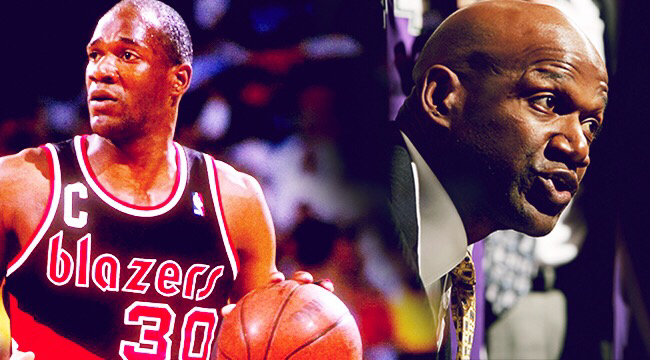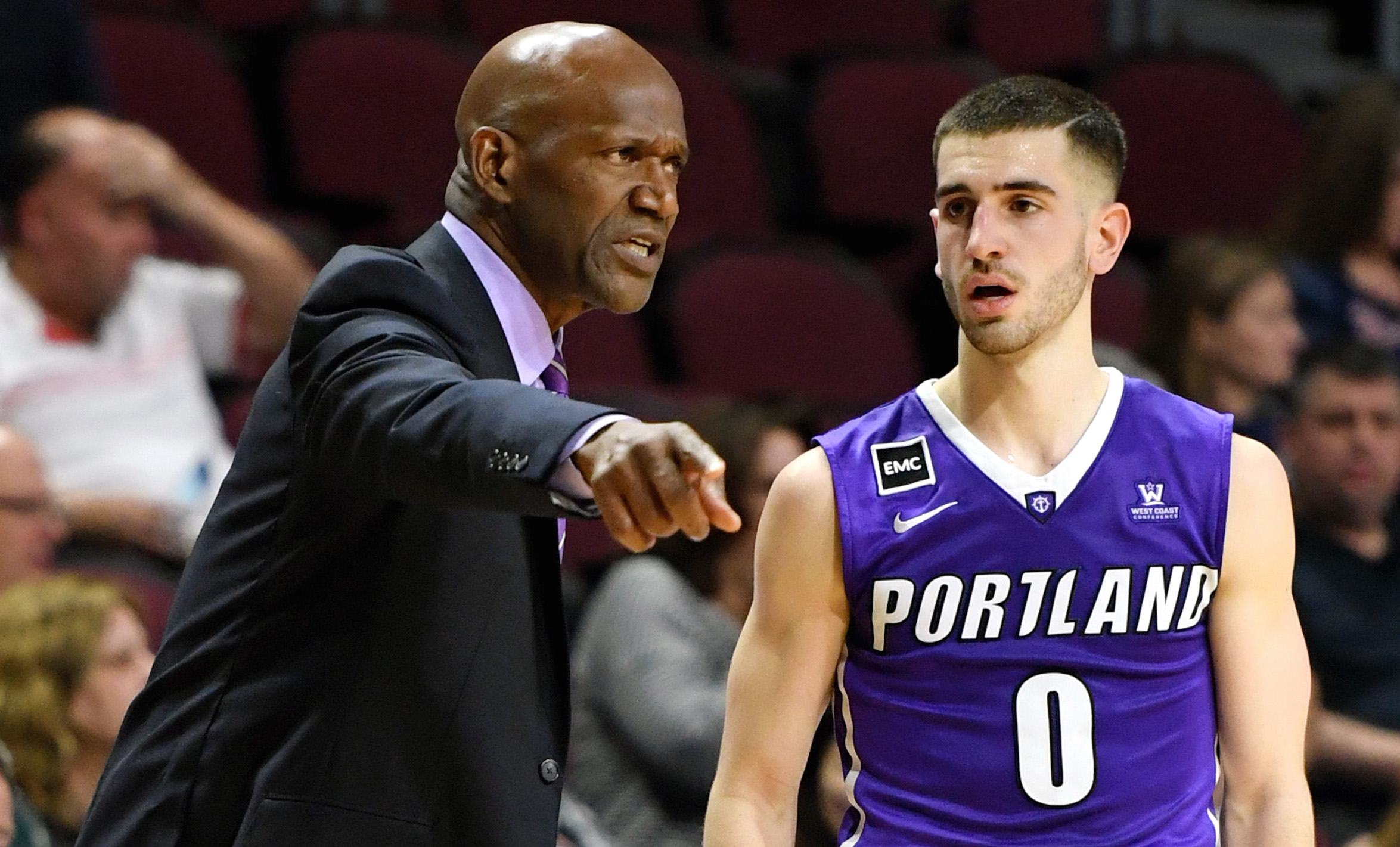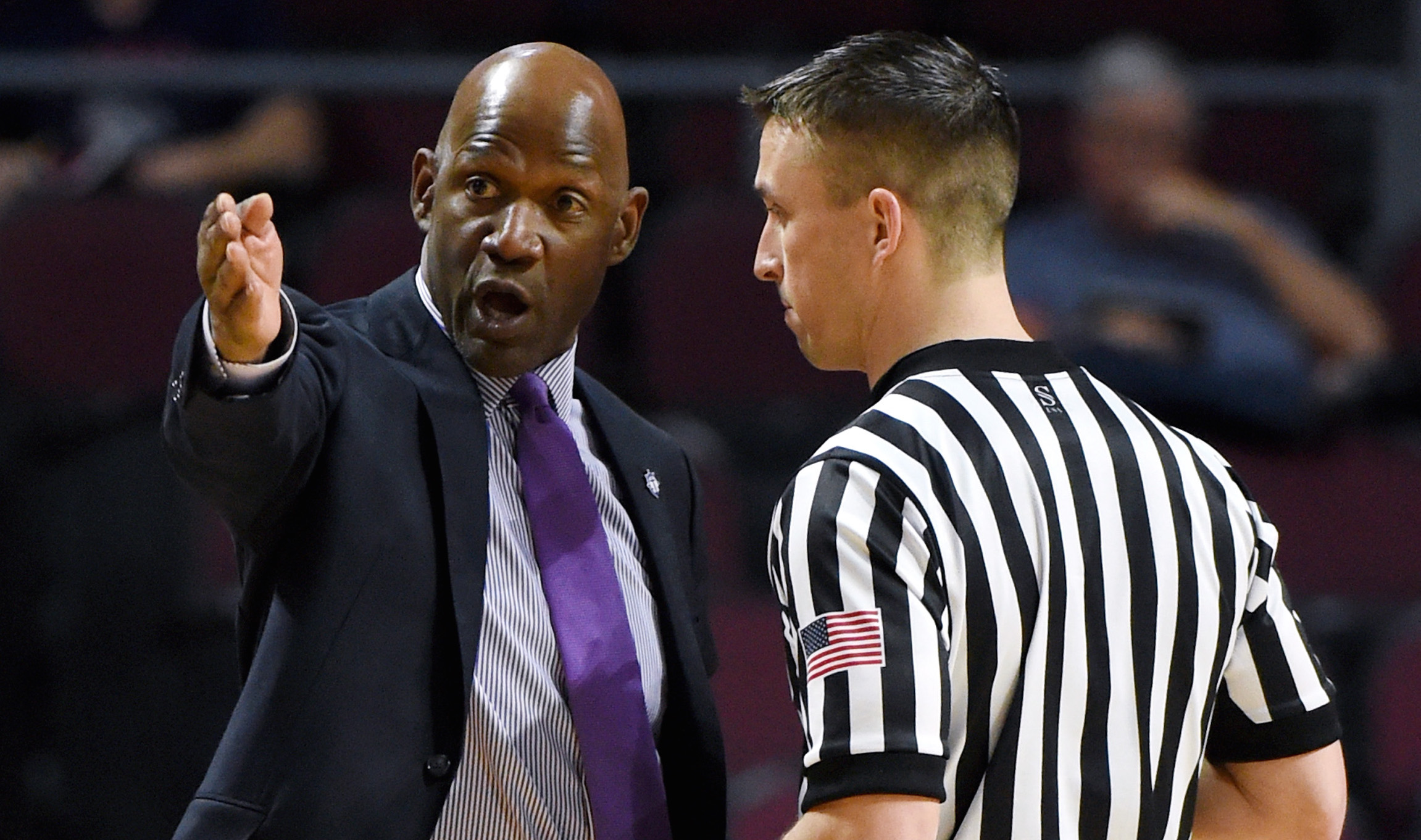
The baseline is lined with purple and white uniforms as one player steps to the free throw line, ball in hand. “Damn,” he says as the ball caroms off the rim, sealing the fate of his teammates.
“Alright, let’s go.” Terry Porter, the second year head coach of the University of Portland Pilots and former NBA player and coach says.
It’s like a horse race just started as the multicolored wood-grain court at the Chile’s Center is vibrating. They go down and back from baseline to baseline, doing a set of sprints and as they approach the finish, you can hear heavy panting throughout the empty arena.
The team grabs a quick drink as Porter and his assistants Bob Cantu, Ben Johnson and Kramer Knutson, come together to chat about their next drill. Cantu, Porter’s lead assistant, coached at USC when players like Taj Gibson and DeMar DeRozan were there, while Johnson coached the likes of Klay Thompson at Washington State. With their staff comes a proven philosophy at the Division-I level that translates into moving players to the next level.
For Porter, he’s getting a chance to coach his two sons, Malcolm and Franklin, both of whom are redshirt players in their sophomore and freshman years respectively. After coaching stints around the NBA in Phoenix, Minnesota, Milwaukee, Detroit and Sacramento, Porter has come here to the University of Portland to “shape the live’s of young men.”
“It’s not just the basketball aspect, it’s about life,” Porter says. “Teaching these young men life lessons and helping them further their careers. As a father with two sons of my own, it’s an everyday battle [chuckles]. But, a lot of the stuff we do and preach on the basketball court, I find really helps in life. The way we operate, I look at the basketball side translating to off-the-court success. In both, everyone has something they bring to the table and you’ve got to find what fits best for the whole group to succeed toward one common goal.”

Porter has played under some of the greatest coaches in basketball history like Gregg Popovich, Jack Ramsay, Rick Adelman, Flip Saunders, and Pat Riley, and as a primary point-guard on many of those teams, he served as the coach on the court before he was a coach on the sidelines. Now, he’s taking those lessons learned in the NBA and bringing them to his Pilots players.
“I’ve been with so many great coaches, there isn’t one that stands out,” Porter said. “I took things from all of them and have tried to implement them in how I coach today.”
Rebounding has been a point of emphasis throughout the practice and they’ve pointed four groups to separate baskets. With coaches launching the ball at all areas of the backboard and hoop, the individualized groups are fighting their teammates for rebounds and putbacks. Drenched in sweat, contesting each rebound and diving for loose balls, you can see the culture and attitude that Porter and his staff have tried to instill in the program.
The drill ends and the players line up on the baseline, one player singled out yet again to shoot another free throw. If he makes it, they move to scrimmage, if he misses they’re doing a set of lines again.
The ball hits the rim and bounces around before dropping through the net, cutting the tense atmosphere as relieved sighs are released across the baseline. The players grab a drink, split up into two teams and began scrimmaging.
“Find it earlier, find it earlier!” Porter yells to his designated scrimmage team. They’re preaching ball movement and an uptempo style like we’ve seen grow so popular in the NBA with the success of teams like the Warriors and Rockets.
Porter, most recently an NBA coach as an assistant with the Minnesota Timberwolves in 2014, is evolving and implementing a new style of play with an old school mentality. He wants the toughness, grit and intensity on every possession like it was in his hay day, while coupling that attitude with the new run-and-gun, pace-and-space style of play.
“Everyone, right or wrong, looks at what the NBA does and tries to do that (the style of play),” Porter said. “It trickles down. I mean, back in my day you would feed your big man twenty to twenty-five times a game. Coaches back then would’ve been screaming and torching guys for shooting threes like they do today. It’s crazy to see the differences in play.”

Getting players who come from all backgrounds of basketball to buy-in, where some were the best players on their respective high-school teams and others may’ve been benched at a big-time university, looks like a very difficult challenge. At a school like University of Portland, the players can aspire to be in the NBA, but some certainly understand what their ceiling is and that this could be the end of their hoops career. Even so, Porter is very attentive to each player and pulls them aside when he needs to.
“I try and coach to my team’s strengths and that’s how I’ve always coached,” Porter said. “If we have a gifted big-man, we’re going to try and do what we can to feed him the ball. If we have good guards who can shoot, we’re going to try and play to their strengths. It just depends on the roster and who you have on the team. But every player has a role and we need to make sure everyone knows that role.”
In University of Portland’s home court, the Chiles Center, which holds just 4,600 fans, the banner hanging on the ceiling reads “NCAA Tournament Appearances 1959, 1996.” With Porter back in the city he calls home, he is trying to bring a university that is known for it’s soccer titles, not basketball ones, back to the Big Dance, but understands its a process.
“First, we want 20 wins, we want conference titles, we want multiple winning seasons, and then we can talk about NCAA tournament bids.” Porter said in regards to the goals of the team. He continued saying “I want what the fans and our players want. I want to go to an NCAA tournament, but we’ve got to build consistency.”
Before Coach Porter was hired, the University of Portland team was 12-20 in the 2015-2016 campaign. In his first season, they fell even further to a record of 11-22. But this season, they’re 6-7 and have lost to some of the best teams in the country like Oklahoma and North Carolina in the inaugural Phil Knight Invitational. It may not be a winning record yet, but the signs of improvement in play paired with the increased strength of schedule are a step in the right direction.
On the practice floor, the scrimmage is a back-and-forth affair as they’re closing in on the last few minutes of their game. Porter stops the play for a late foul and says “one and one, you got to earn it.” The teams are knotted up at 86 in a scrimmage where the intensity level masks that of a real game. The player heads to the free throw line and makes his first, earning him the second that he subsequently sinks as well. Everything in the practice is earned through free throws and hard work, and that is going to be this teams’ DNA throughout the season.
Playing in the West Coast Conference, where the best teams possess many upperclassmen and journeyman college basketball players, it’s going to be a tough hill to climb for Porter’s young University of Portland team which has seven freshman, only two seniors and three juniors and sophomores. But, sitting at just under .500 with a few close losses may be a blessing in disguise two to three seasons from now.
“Last year, we won our first two conference games last year and then we didn’t win anymore,” Porter said. “We came back and won a conference tournament game, and I think that shows you what we can build on and where we came from.”
Porter’s been to NBA Finals and played with some of the best players and coaches in NBA history, but the pride and smile he holds with his relatively new gig, sums it up quite perfectly. He’s coaching his two sons and this young Pilots team, going on a journey that is similar to the one he went on as a college player from a small D-III school in Wisconsin to the NBA. He has a chance to re-live his college days with family, and build something from the ground up. Many could question the decision of leaving NBA coaching for college, but few could argue with his motives.






